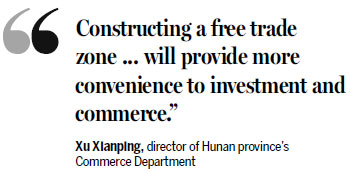Inland areas seek free trade zone approval
Updated: 2016-02-22 08:09
By Zhong Nan in Shanghai and Feng Zhiwei in Changsha(China Daily)
|
||||||||
Inland provinces and autonomous regions are allocating a growing proportion of their fiscal revenue toward improving their chances of being selected as a free trade zone.
By building the necessary infrastructure to compete with provinces in coastal regions, the inland areas hope to shift the spotlight as the central government enters its third round of selection for the FTZs.
Even though the shift is still in its early stages, it could have profound implications for China's current business map, as inland regional economies are relatively much more extensive than coastal ones such as Zhejiang and Jiangsu.
Henan's local government report for this year said the province will improve the construction and competitive edge of Zhengzhou Airport Comprehensive Economic Experimental Zone and build Zhengzhou Cross-border E-commerce Pilot Zone, in a bid to improve the chances of success for its FTZ application.
Similarly, Shaanxi wants to use the proposed FTZ to promote trade with Central Asia, the Middle East and Europe, and establish cooperation with 13 domestic ports such as Ningbo-Zhoushan, Qingdao and Shenzhen.
Hunan province plans to establish an FTZ encompassing the three cities of Changsha, Zhuzhou and Xiangtan to boost the export of railway transportation technologies and equipment, new industrial materials and high-end construction machinery.
Xu Xiangping, director of Hunan province's Commerce Department, stressed that the transport capacity of the international freight train services between Changsha, the provincial capital, Duisburg in Germany and Tashkent in Uzbekistan could improve trade in auto parts, chinaware and tea.
"Constructing a free trade zone with an international investment environment and administrative system will provide more convenience to investment and commerce," Xu said.
However, Changsha is facing tough competition as other major inland cities including Chongqing, Zhengzhou and Wuhan have all operated weekly freight train services to Europe so as to increase their chances of gaining the right to establish FTZs.
In the meantime, border provinces such as Yunnan, Heilongjiang, the Inner Mongolia autonomous region and Guangxi Zhuang autonomous region are also striving to build FTZs based on cross-border trade.
The biggest disadvantage for inland provinces is that they do not have ports to help boost trade volume, said Lu Jinrong, director of the China Research Center for Foreign Direct Investment at the University of International Business and Economics in Beijing.
Contact the writers at fengzhiwei@chinadaily.com.cn

(China Daily 02/22/2016 page5)
- Green cards decision to bear fruit for foreigners
- Beijing to raise level for air pollution 'red alerts'
- Fake story sparks cyberspace reliability fears
- Missing children found safe in nearby village
- Rich Chinese splurge on sportswear as luxury's lustre dims
- Urgent remedy sought for pediatrician shortage

 The world in photos: Feb 15 - 21
The world in photos: Feb 15 - 21
 China Daily weekly pictures: Feb 13-19
China Daily weekly pictures: Feb 13-19
 Lantern Festival in the Chinese paintings
Lantern Festival in the Chinese paintings
 Meet Melanie, the real-life mermaid
Meet Melanie, the real-life mermaid
 Samsung unveils new products at mobile conference in Spain
Samsung unveils new products at mobile conference in Spain
 88th Academy Awards Governors Ball Press Preview
88th Academy Awards Governors Ball Press Preview
 Chinese photographers' work shines in major photo contest
Chinese photographers' work shines in major photo contest
 Egg carving master challenges Guinness World Record
Egg carving master challenges Guinness World Record
Most Viewed
Editor's Picks

|

|

|

|

|

|
Today's Top News
What ends Jeb Bush's White House hopes
Investigation for Nicolas's campaign
Will US-ASEAN meeting be good for region?
Accentuate the positive in Sino-US relations
Dangerous games on peninsula will have no winner
National Art Museum showing 400 puppets in new exhibition
Finest Chinese porcelains expected to fetch over $28 million
Monkey portraits by Chinese ink painting masters
US Weekly

|

|








